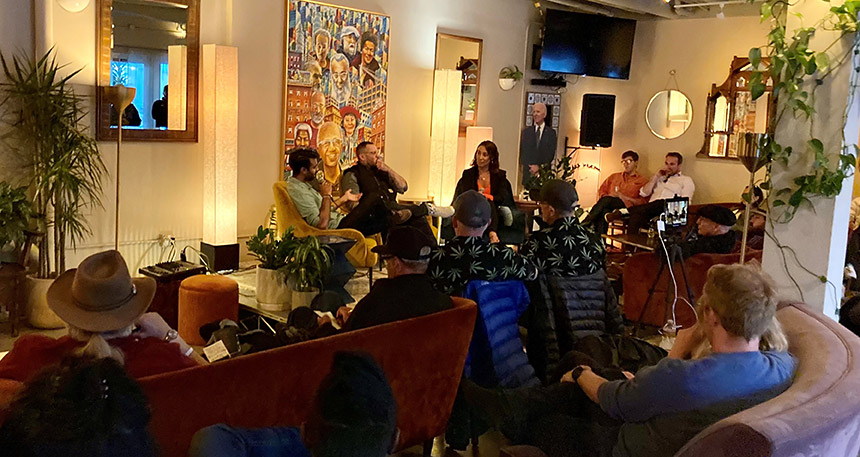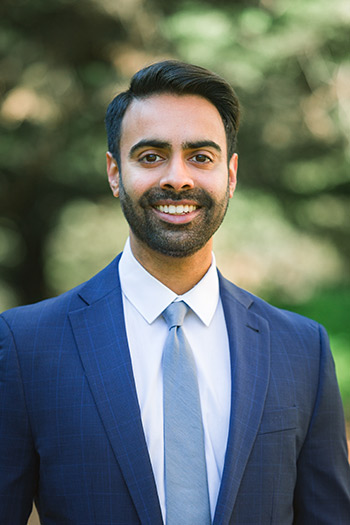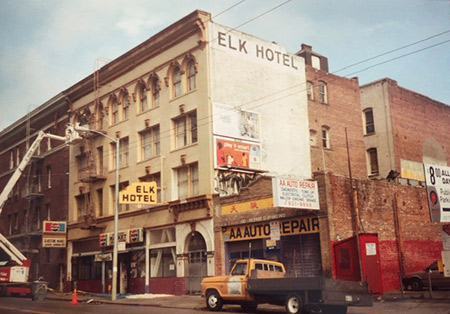
By Andrew Cohen
For Nikesh Patel ’15, versatility is more than a positive attribute — it’s an occupational requirement. As the director of San Francisco’s Office of Cannabis, he works with everyone from growers to licensing agencies, dispensary owners to police officers, nonprofit leaders to city administrators.
Raised in the city’s Tenderloin District, Patel graduated from Stanford and received a master’s from Oxford before enrolling at Berkeley Law. He started his career at the Santa Clara County District Attorney’s Office before joining the San Francisco District Attorney’s Office as a public affairs and policy assistant.

Named an assistant district attorney in May 2017, Patel was assigned to the city’s trailblazing pre-booking diversion program, LEAD SF, which worked to reduce the incarceration of low-level drug offenders. He managed 200-plus participants, presented at public meetings, and collaborated with numerous partners to improve outcomes for program participants.
In October 2019, Patel became associate director of oversight at the Office of Cannabis, serving as a liaison between the office and the city’s Cannabis Oversight Committee. Named director in February, he works to uphold the office’s equity mission, coordinates with San Francisco and state agencies, develops policies, and helps lead the local cannabis industry.
Cannabis has been legal in San Francisco since Jan. 1, 2017, creating a still-evolving regulatory frontier. Patel recently discussed that growth, and his role in shaping it.
What sparked your interest in joining San Francisco’s Office of Cannabis and working within a new legal landscape?
I grew up in San Francisco, and in particular, the Tenderloin. I lived in a single-room occupancy hotel with multiple generations of family at any given time. I know what it feels like to come from a neighborhood that can feel unseen at times and heavily scrutinized at others; to be from a community where the hope to make things better is palpable but the understanding of how isn’t.
The city’s Equity Program offers hope and creates opportunity for San Franciscans who have faced serious hardship. It offers social equity applicants an opportunity to enter the regulated commercial cannabis space before it fully develops. It prioritizes their applications for cannabis business permits before non-equity applicants. It gives them access to free legal and technical services and grant funding to navigate the permit process and ultimately open their businesses.
Today, through the Equity Program, over $5.5 million in grants have been made available to support our applicants. More grants are on the way. Even better, 24 new equity-owned cannabis businesses that didn’t exist several years ago have opened and are operating today. They represent hope being actualized and opportunity being grasped.
How would you describe the best part of your job?
One of the more gratifying aspects is also just as humbling: The moments when social equity applicants receive their business permits are rewarding. They represent an applicant’s successful journey through a complicated and expensive process. They represent lawful ownership of a business the person may never have imagined being able to own. They signify potential access to generational wealth.
For every one of these moments though, it’s also a reminder that there are more people waiting to experience the same feelings, and that we have a responsibility to augment our processes and become better every day.
What are people’s main misconceptions about cannabis regulation?
We hear a range. Common examples include a misunderstanding about the Office of Cannabis’ administrative and regulatory role, the Reefer Madness tropes that cannabis is a “gateway drug,” and that legalizing adult-use cannabis will contribute to a retail shop on every block.

Taking those in turn, the OOC is a neutral regulatory and administrative body. Although our office can issue regulations and publish bulletins, we are unable to intervene legislatively — whether locally, statewide, or federally. Our office, like other regulatory bodies, must operate within its legal confines.
Regarding cannabis as a “gateway drug,” that myth ranges from debatable on one end to debunked on the other. For example, the Drug Policy Alliance published robust findings on the matter to debunk this claim. The CDC has injected nuance into the conversation noting that there are many factors contributing to whether someone will use more dangerous drugs, such as socioeconomic status and existing mental health illnesses.
Regarding a dispensary on every block, there are clear sensitive use areas informing where cannabis retail can be located and how close they can be to one another. Notwithstanding some nuances, such as certain grandfathering for Prop 215 Medical Dispensaries, new cannabis retailers can’t be within 600 feet of one another in San Francisco.
What are the top challenges in meeting your office’s public health, safety, and social justice goals?
The OOC believes in open, transparent, and accessible government. Part of that philosophy is maintaining strong lines of communication across stakeholders. As a result, one of our main challenges is balancing the breadth and evolving interests represented in the cannabis industry. What may advance one person’s social justice goals, for instance, may raise public health and safety concerns for someone else.
As an example, some see permitting cannabis events as creating opportunities to regulate public cannabis consumption and to showcase local vendors and the equity community. For others, they view these same events as creating public safety and health concerns where the events are held. In the spirit of being open and transparent, we work hard to thoughtfully implement our regulatory safeguards and to educate our stakeholders about the changing landscape of cannabis.
How is the office working to build strong relationships between local police and city dispensaries?
The OOC takes seriously its ability to bring together both law enforcement and permitted cannabis operators to enhance public safety. For example, following a string of targeted attacks against dispensaries in the summer of 2020, the OOC convened the first-ever SFPD-Cannabis Industry meeting. The goal was to create a safe space for shared understandings and best practices between law enforcement, including SFPD and the District Attorney’s Office, and operators.
Since then, our office has helped facilitate more routine meetings. We’re thankful to both our community and City partners for continuing to lean in. Relatedly, coordination between local jurisdictions and state regulatory agencies is essential for effective enforcement. The California dual licensing structure for commercial cannabis businesses requires a partnership between locals and the state. We thank our state partner, the Department of Cannabis Control, for their ongoing collaboration.
What are the economic benefits for cannabis growers and distributors transitioning to a legal/regulated space, and also for the city?
To start, by not transitioning, unregulated operators continue to subject themselves to the prospect of enforcement across a range of government agencies: the Department of Cannabis Control, the California Department of Tax and Fee Administration, the California Department of Fish and Wildlife, and the state Department of Justice, to name a few. In San Francisco, the economic benefits of transitioning to a regulated space are baked into our office’s programs and the code we enforce.
Through the Amnesty Program, we help transition unregulated operators to the regulated market. Through the Social Equity Program, applicants are provided free technical assistance, prioritized in the permitting process, and can be eligible for grant funding to help open their businesses. We’ve also created a first-of-its-kind Cannabis Event Pilot Program, through which several events have featured permitted cannabis businesses.